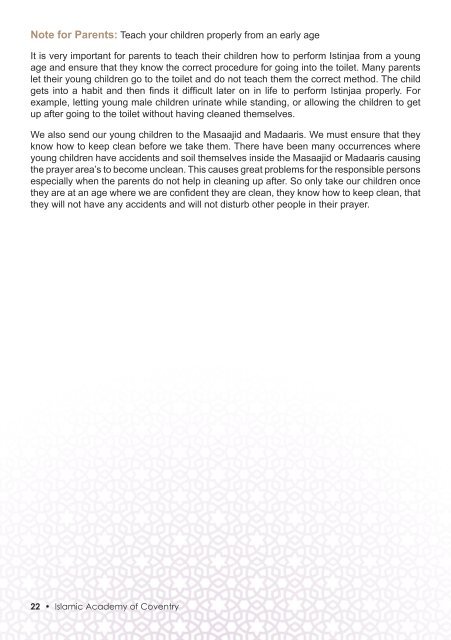You also want an ePaper? Increase the reach of your titles
YUMPU automatically turns print PDFs into web optimized ePapers that Google loves.
Note for Parents: Teach your children properly from an early age<br />
It is very important for parents to teach their children how to perform Istinjaa from a young<br />
age and ensure that they know the correct procedure for going into the toilet. Many parents<br />
let their young children go to the toilet and do not teach them the correct method. The child<br />
gets into a habit and then finds it difficult later on in life to perform Istinjaa properly. For<br />
example, letting young male children urinate while standing, or allowing the children to get<br />
up after going to the toilet without having cleaned themselves.<br />
We also send our young children to the Masaajid and Madaaris. We must ensure that they<br />
know how to keep clean before we take them. There have been many occurrences where<br />
young children have accidents and soil themselves inside the Masaajid or Madaaris causing<br />
the prayer area’s to become unclean. This causes great problems for the responsible persons<br />
especially when the parents do not help in cleaning up after. So only take our children once<br />
they are at an age where we are confident they are clean, they know how to keep clean, that<br />
they will not have any accidents and will not disturb other people in their prayer.<br />
Ghusl<br />
Ghusl is the procedure, which a person undertakes to clean their body from ritual impurity<br />
or ‘Janaabat’. If a person does not do Ghusl properly then they will not leave the state of<br />
Janaabat and any acts of worship, which require a condition of cleanliness, will not be valid.<br />
Question:<br />
Answer:<br />
When does a person need to have Ghusl?<br />
For females, Ghusl becomes compulsory in the following scenarios<br />
• After completing her menstrual cycle<br />
• At the end of postnatal bleeding<br />
• After having relations with her husband<br />
• After experiencing a nocturnal emission<br />
Once a person has experienced any of the above they must perform Ghusl to become<br />
ritually pure again. They must NOT perform any of the restricted prayer actions mentioned<br />
earlier whist in this state.<br />
Compulsory acts in Ghusl<br />
There could sometimes be a need to only perform the Faraidh (compulsory) acts of Ghusl in<br />
certain situations. For example, if there is a shortage of water, or of time etc.<br />
For a person to become ritually pure they must perform at a minimum the following actions:<br />
• To gargle the mouth once (If fasting ensure water does not get swallowed,<br />
keep water in mouth).<br />
• To clean inside the nose once (If fasting ensure water does not pass through<br />
the nose into the head).<br />
• To wash the whole body once, ensuring no space is left dry (even that which<br />
is equivalent to a hair).<br />
Once the above actions have been completed, a person will now be considered clean and<br />
ritually pure.<br />
22 • Islamic Academy of Coventry <strong>Female</strong> <strong>Hygiene</strong> • 23


